[英语]虚拟语气表格归纳
- 格式:doc
- 大小:61.00 KB
- 文档页数:5
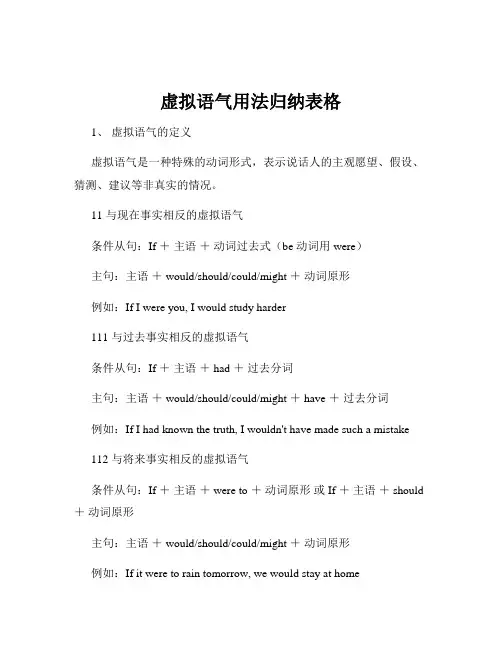
虚拟语气用法归纳表格1、虚拟语气的定义虚拟语气是一种特殊的动词形式,表示说话人的主观愿望、假设、猜测、建议等非真实的情况。
11 与现在事实相反的虚拟语气条件从句:If +主语+动词过去式(be 动词用 were)主句:主语+ would/should/could/might +动词原形例如:If I were you, I would study harder111 与过去事实相反的虚拟语气条件从句:If +主语+ had +过去分词主句:主语+ would/should/could/might + have +过去分词例如:If I had known the truth, I wouldn't have made such a mistake 112 与将来事实相反的虚拟语气条件从句:If +主语+ were to +动词原形或 If +主语+ should +动词原形主句:主语+ would/should/could/might +动词原形例如:If it were to rain tomorrow, we would stay at home121 wish 后的宾语从句与现在事实相反:从句用一般过去时与过去事实相反:从句用过去完成时与将来事实相反:从句用 would/could +动词原形例如:I wish I were a bird (与现在事实相反)122 would rather 后的宾语从句与现在或将来事实相反:从句用一般过去时与过去事实相反:从句用过去完成时例如:I would rather you came tomorrow (与将来事实相反)13 虚拟语气在主语从句中的应用It is +形容词+ that 句型中,形容词为 necessary, important, strange 等时,从句用“should +动词原形”,should 可以省略。
例如:It is necessary that we (should) study hard14 虚拟语气在表语从句和同位语从句中的应用与主语从句类似,在 suggestion, proposal, order 等名词后的表语从句和同位语从句中,从句用“should +动词原形”,should 可以省略。

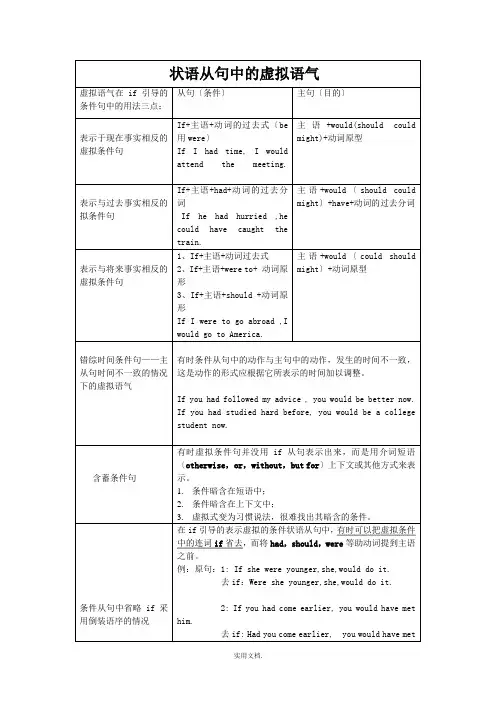
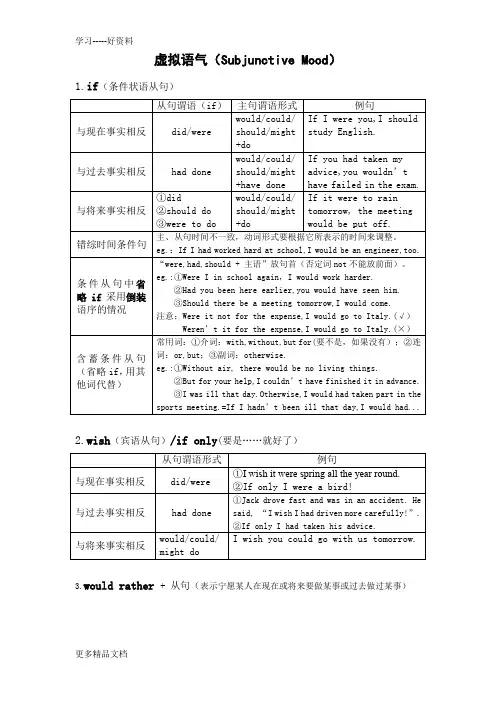
虚拟语气(Subjunctive Mood )1.if (条件状语从句) 从句谓语(if ) 主句谓语形式 例句与现在事实相反 did/were would/could/should/might +doIf I were you,I shouldstudy English.与过去事实相反 had done would/could/should/might +have done If you had taken myadvice,you wouldn ’thave failed in the exam.与将来事实相反 ①did ②should do ③were to do would/could/should/might +do If it were to raintomorrow, the meeting would be put off.主、从句时间不一致,动词形式要根据它所表示的时间来调整。
eg.:If I had worked hard at school,I would be an engineer,too.“were,had,should + 主语”放句首(否定词not 不能放前面)。
eg.:①Were I in school again ,I would work harder. ②Had you been here earlier,you would have seen him. ③Should there be a meeting tomorrow,I would come. 注意:Were it not for the expense,I would go to Italy.(√)Weren ’t it for the expense,I would go to Italy.(×)常用词:①介词:with,without,but for(要不是,如果没有);②连词:or,but ;③副词:otherwise. eg.:①Without air, there would be no living things. ②But for your help,I couldn ’t have finished it in advance.③I was ill that day.Otherwise,I would had taken part in thesports meeting.=If I hadn ’t been ill that day,I would had...2.wish (宾语从句)/if only (要是……就好了)从句谓语形式 例句 ①I wish it were spring all the year round. ②If only I were a bird!与过去事实相反had done①Jack drove fast and was in an accident. He said, “I wish I had driven more carefully!”. ②If only I had taken his advice.would/could/might do I wish you could go with us tomorrow.3.would rather + 从句(表示宁愿某人在现在或将来要做某事或过去做过某事) 条件从句中省略if 采用倒装语序的情况 含蓄条件从句(省略if ,用其他词代替) 错综时间条件句 与现在事实相反 与将来事实相反did/were从句谓语形式 例句与现在或将来事实相反 did/were I would rather you came tomorrow.与过去事实相反 had doneI ’d rather you hadn ’t been present. 4.as if/as though,even if/though + 从句从句谓语形式 例句 与现在事实相反did/were He looked as if he were an artist. He talked about the Great Wall as if he had been there before.would/could/might do He opened his mouth as if he would say something.注意:1.在as if/as though 句中,如果有可能成为事实,用陈述语气。
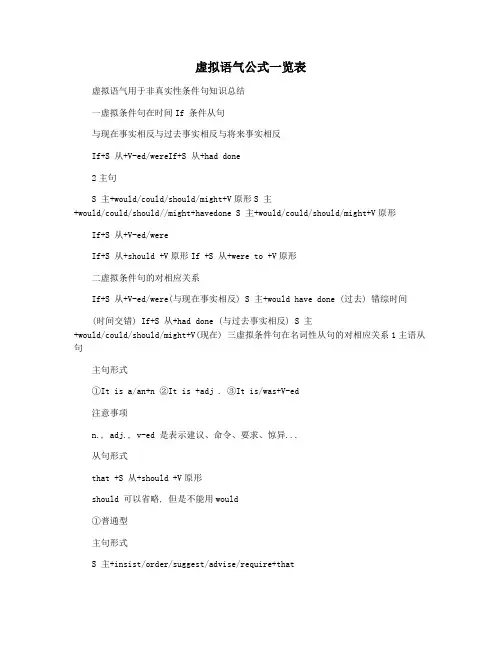
虚拟语气公式一览表虚拟语气用于非真实性条件句知识总结一虚拟条件句在时间If 条件从句与现在事实相反与过去事实相反与将来事实相反If+S 从+V-ed/wereIf+S 从+had done2主句S 主+would/could/should/might+V原形S 主+would/could/should//might+havedone S 主+would/could/should/might+V原形If+S 从+V-ed/wereIf+S 从+should +V原形If +S 从+were to +V原形二虚拟条件句的对相应关系If+S 从+V-ed/were(与现在事实相反) S 主+would have done (过去) 错综时间(时间交错) If+S 从+had done (与过去事实相反) S 主+would/could/should/might+V(现在) 三虚拟条件句在名词性从句的对相应关系1主语从句主句形式①It is a/an+n ②It is +adj .③It is/was+V-ed注意事项n., adj., v-ed 是表示建议、命令、要求、惊异...从句形式that +S 从+should +V原形should 可以省略, 但是不能用would①普通型主句形式S 主+insist/order/suggest/advise/require+that注意事项从从句形式原形should 可以省略, 但不能用would②wish 型时间现在过去将来S 主+wish+that主句形式S 从+were/V-ed主句谓语动词S 从+had+done 或者S 从+could +have doneS 从+could/might/would+V(主句主语和从句主语不同)3. 同位语从句主句形式S 主+V+N .从句形式that +S +should +V原形(同位名词是表示建议、命令、要求、惊异等意思的名词) 4. 表语从句公式:The N. +be+that +S从+should+V(原形)主语N. 是表示建议、命令、要求、惊异等意思的名词四虚拟条件句在的对相应关系类型让步连接词even ifeven though as ifas though lest in case for fear that时间现在、将来过去现在过去将来目的将来S 主+V主+O主S 主+V主+O主主句形式S 主+should+doS 主+should+havedone从句形式S 从+were/V-edS 从+haddone S 从+were/V-edS 从+haddone S 从+should+doS 从+should+do方式五.虚拟语气其他类型It is time…型类型It is time thatIt is high time that It is about time thatS 从+were/V-edS 从+should(不可省略)+V 原形从句形式2. if only 型(多为感叹句)时间现在没有实现的愿望过去没有实现的愿望将来没有可能实现的愿望S+were/V-edS+haddone S+would+V原形形式3. 倒装句正常语序If+S从+were…If+S从+haddone …If+S从+should +V 原形Were +S 从…Had +S从+done…Should +S 从+V 原形倒装语序4. would rather 型时间现在/未来过去主句形式从句形式S 从+V-ed/were…S 从+had done…S 主+would rather/wouldsooner/5. 含蓄条件句(介词短语)类型时间现在/未来介词+短语过去形式S +should/would/could/might+V 原形S +would/should/+have+done 常见介词but, or, but for, without, otherwise…。
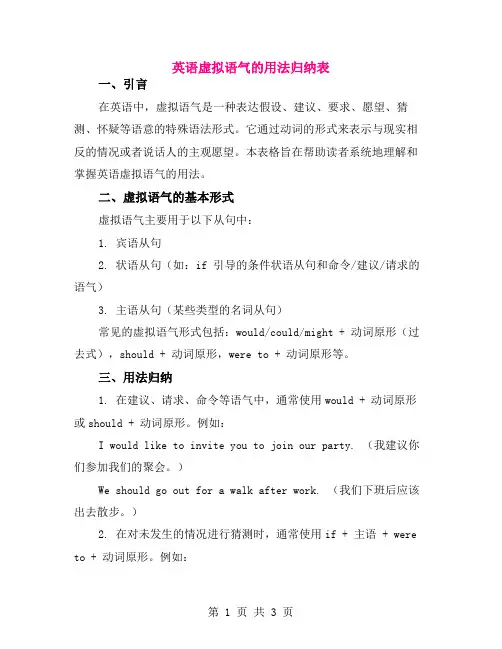
英语虚拟语气的用法归纳表一、引言在英语中,虚拟语气是一种表达假设、建议、要求、愿望、猜测、怀疑等语意的特殊语法形式。
它通过动词的形式来表示与现实相反的情况或者说话人的主观愿望。
本表格旨在帮助读者系统地理解和掌握英语虚拟语气的用法。
二、虚拟语气的基本形式虚拟语气主要用于以下从句中:1. 宾语从句2. 状语从句(如:if 引导的条件状语从句和命令/建议/请求的语气)3. 主语从句(某些类型的名词从句)常见的虚拟语气形式包括:would/could/might + 动词原形(过去式),should + 动词原形,were to + 动词原形等。
三、用法归纳1. 在建议、请求、命令等语气中,通常使用would + 动词原形或should + 动词原形。
例如:I would like to invite you to join our party. (我建议你们参加我们的聚会。
)We should go out for a walk after work. (我们下班后应该出去散步。
)2. 在对未发生的情况进行猜测时,通常使用if + 主语 + were to + 动词原形。
例如:If they were to accept our proposal,we would negotiate further. (如果他们接受我们的提议,我们会进一步谈判。
)If I were you,I would take a vacation before making a decision. (如果我是你,我就会在做出决定前先休息一下。
)3. 在表达强烈的建议或愿望时,通常使用过去时态的动词(如:should + 动词原形或were to + 动词原形)。
例如:You should take immediate action to solve the problem. (你应该立即采取行动解决问题。
)Were it not for your help,we would have failed. (如果没有你的帮助,我们就会失败。
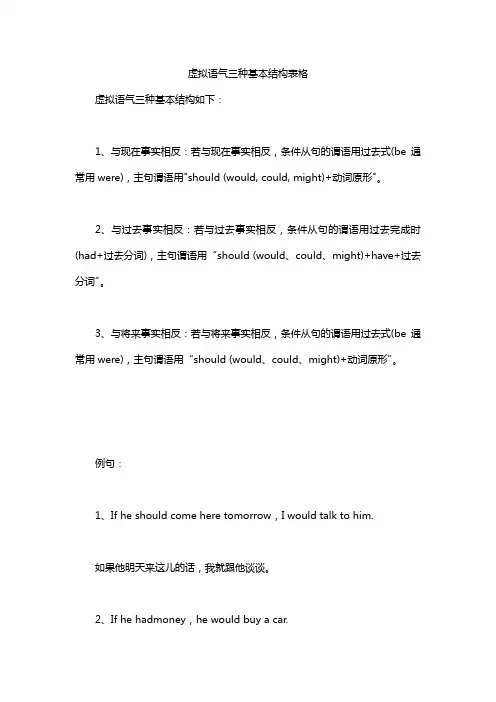
虚拟语气三种基本结构表格
虚拟语气三种基本结构如下:
1、与现在事实相反:若与现在事实相反,条件从句的谓语用过去式(be通常用were),主句谓语用"should (would, could, might)+动词原形"。
2、与过去事实相反:若与过去事实相反,条件从句的谓语用过去完成时(had+过去分词),主句谓语用“should (would、could、might)+have+过去分词”。
3、与将来事实相反:若与将来事实相反,条件从句的谓语用过去式(be通常用were),主句谓语用“should (would、could、might)+动词原形”。
例句:
1、If he should come here tomorrow,I would talk to him.
如果他明天来这儿的话,我就跟他谈谈。
2、If he hadmoney,he would buy a car.
如果他有钱,他会买辆车。
3、Had he done it(if he had done it),he would have felt sorry. 如果他当时做了这件事,他会后悔的。
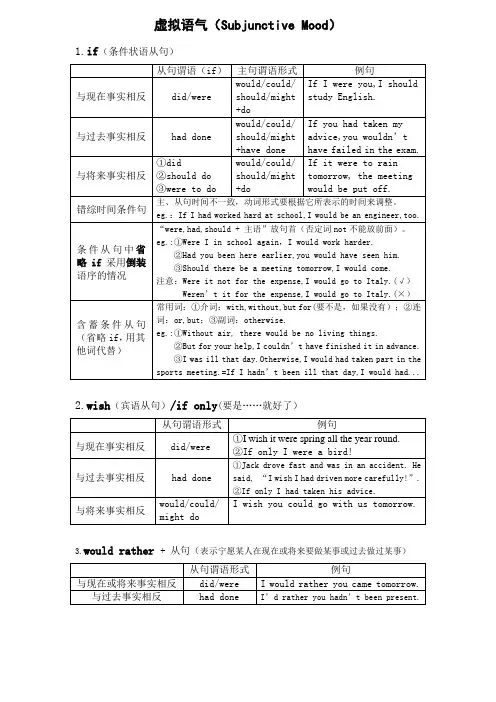
虚拟语气(Subjunctive Mood)1.if(条件状语从句)2.wish(宾语从句)/if only(要是……就好了)3.would rather+ 从句(表示宁愿某人在现在或将来要做某事或过去做过某事)4.as if/as though,even if/though + 从句--------------------------------------------------------------------- 5.在表示“坚持、要求、命令、建议”之类的动词后的宾语从句中,用“(should)+动词原形”。
6.虚拟语气用于主语从句7.虚拟语气用于表语从句、同位语从句 [用(should)+动词原形]8.虚拟语气用于定语从句这种从句常用在It is (high) time (that)...句型中,定语从句的谓语动词用过去式或should + 动词原形(should不能省略,be用were来表示),意【好题珍藏】1.Grace doesn’t want to move to New York because she thinks if she there, she wouldn’t be able to see her parents very often. (Pano M6 P16:15) A.lives B.would live C.has lived D.were to live【解析】主句说明了客观事实,if从句是对将来事实的假设。
见“1.if(条件状语从句)——与将来事实相反”。
【答案】D2.If Mr.Dewey present,he would have offered any possible assistance to the people there. (Pano M6 P16:16) A.were B.had been C.should be D.was【解析】见“1.if(条件状语从句)——与过去事实相反”。
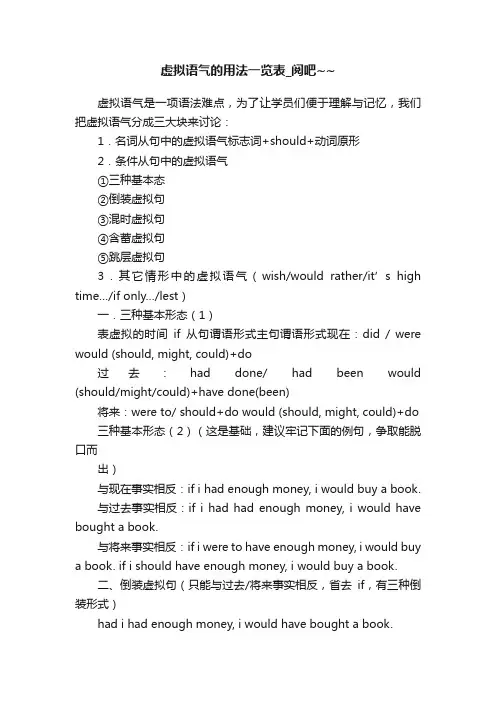
虚拟语气的用法一览表_阅吧~~虚拟语气是一项语法难点,为了让学员们便于理解与记忆,我们把虚拟语气分成三大块来讨论:1.名词从句中的虚拟语气标志词+should+动词原形2.条件从句中的虚拟语气①三种基本态②倒装虚拟句③混时虚拟句④含蓄虚拟句⑤跳层虚拟句3.其它情形中的虚拟语气(wish/would rather/it’s high time…/if only…/lest)一.三种基本形态(1)表虚拟的时间if从句谓语形式主句谓语形式现在:did / were would (should, might, could)+do过去:had done/ had been would (should/might/could)+have done(been)将来:were to/ should+do would (should, might, could)+do 三种基本形态(2)(这是基础,建议牢记下面的例句,争取能脱口而出)与现在事实相反:if i had enough money, i would buy a book.与过去事实相反:if i had had enough money, i would have bought a book.与将来事实相反:if i were to have enough money, i would buya book. if i should have enough money, i would buy a book.二、倒装虚拟句(只能与过去/将来事实相反,省去if,有三种倒装形式)had i had enough money, i would have bought a book.were i to have enough money, i would buy a book.should i have enough money, i would buy a book.三、混合时间虚拟语气(主要是抓住时间状语)(对过去事实虚拟+对现在事实虚拟)if i had studied english at school, i could read the english novel now. (对现在事实虚拟+对过去事实虚拟)if she were not so careless, she wouldn’t have made such a mistake.四、含蓄虚拟句what would i have done without you?but for their help, i would not have finished the task.but that the doctor arrived on time that day, they would have been dead. given more time, i would have been able to finish the test.五、跳层虚拟句(即句子一半为虚拟,另一半为陈述语气;but前句用虚拟而or/otherwise后句用虚拟)(but) he would put on weight, but he doesn’’’’’’’’t eat much. (与现在事实相反)he would have put on weight, but he didn’’’’’’’’t eat much. (与过去事实相反)(or, or else, otherwise) i forget where i read the article, or i would show it to you now. 现在事实相反)mary couldn’’’’’’’’t have received my letter, otherwise she would have replied before now. (与过去事实相反)六、名词从句虚拟语气(1) ask, advise, beg, command, demand, decide, desire, insist, order, prefer, propose, require, recommend, request, suggest, urge等表示命令、要求、建议等含义的动词后的宾语从句中,谓语动词用(should)+动词原形,eg. i suggest / suggested that we (should) go tomorrow.名词从句虚拟语气(2) it is +(形容词/过去分词/特定名词)+that的从句中,形容词主要是表示令人吃惊的、重要的、必要的、关键的等词汇。
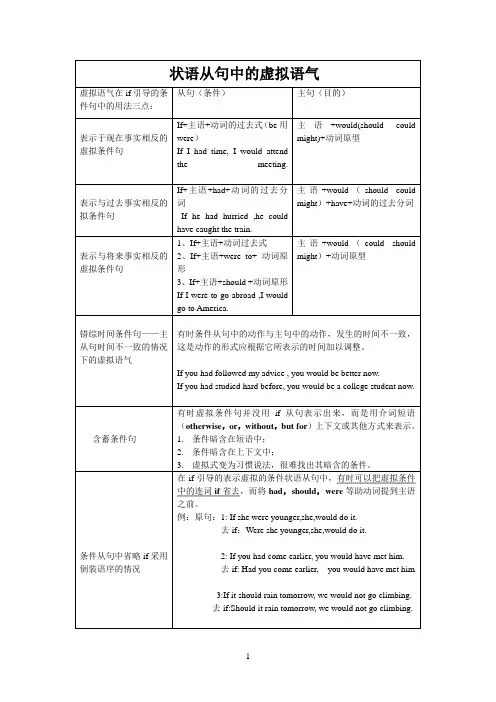
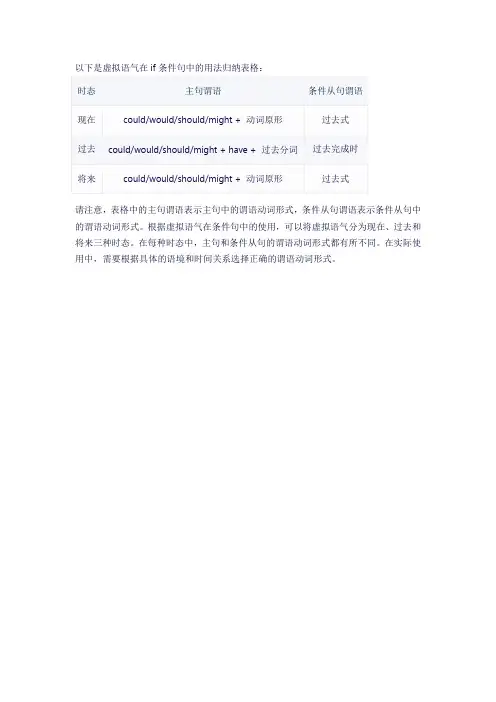
虚拟语气一、虚拟语气用于非真实条件句(一)形式I.动词的语气简介:语气——表示说话人对说话内容的看法的一种语法范畴。
在英语中,可用不同的动词形式表示说话的语气。
•虚拟语气——与事实相反,表达的是怀疑、忧虑推测、祝愿等。
II.虚拟语气的运用一、在if条件从句中的运用(一)表格及注意事项•注:• 1. 目前,虚拟语气的were除了在If I were you 的结构中不能改动外,其他有些情况可以用was。
• 2. 如果表示否定的意思,多用过去时结构,用should和were to较少。
(二)、虚拟条件句中的省略和倒装若符合下列条件,可以省略if:• 1.必须是非真实条件句,并且有时,才可以省略if.• 2.省略if时,主语与的位置必须相互调换。
例:(1)万一我见到她,我会告诉她的。
If I should meet her, I would tell her.(2)如果我处在你的位置上,我会做得更好。
If I were in your position, I would do it better.(3)如果他们准备了的话,他们应该能成功的。
If they had made preparations, they would have succeeded.(三)含蓄条件句假设情况不以if条件句表现出来,而是通过某个介词或介词短语,不定式表现出来。
如with,without,but,but for, otherwise等。
根据句子要表达的事态,选择相应的虚拟语气的形式。
I lost her phone number, otherwise I her up.我弄丢了她的电话号码,否则我就能打给她了If I had not lost her phone number…But for your help, I would not have the chance to go to school.要不是有你的帮助,我不会有机会去学校的。
虚拟语气的时态归纳表
虚拟语气是一种用来表达虚构、假设、愿望或建议的语气。
在英语中,虚拟语气通常通过使用特定的动词形式来表示。
以下是虚拟语气的时态归纳表:
现在时:
1. 过去时 would/could/should + 动词原形
例如:I wish I could go to the party tonight.(我希望我今晚能去参加派对。
)
过去时:
1. 过去完成时 had + 过去分词
例如:If I had known the answer, I would have told you.(如果我知道答案,我会告诉你的。
)
将来时:
1. 条件将来时 would/could/should + 动词原形
例如:If I won the lottery, I would buy a big house.(如果我中了彩票,我会买一栋大房子。
)
过去完成时:
1. 过去完成时 would/could/should + have + 过去分词
例如:If I had studied harder, I would have passed the exam.(如果我学得更努力一些,我就会通过考试了。
)
通过虚拟语气,我们可以表达对于现实中不可能或未实现的愿望、假设和建议。
在日常生活和写作中,虚拟语气经常被用来表达对过去的遗憾、对未来的期望以及对条件和假设的陈述。
虚拟语气在英语中有广泛的应用,包括官方声明、媒体报道、小说、对话等等。
熟练掌握虚拟语气的时态使用是提高英语表达能力的重要一步。